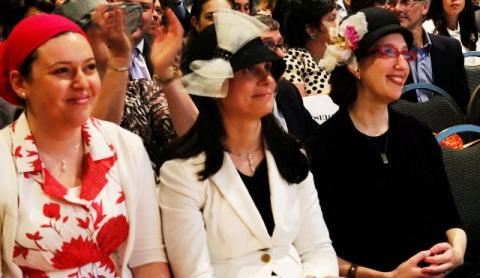Women are fighting for an Orthodox Jewish revolution - in Manhattan and beyond
A graduate of the program is “qualified and equipped as a new kind of leader in the Orthodox community and beyond,” not exactly a rabbi, but close. Currently, Yeshivat Maharat has fourteen students enrolled in the program. A month ago, three women were ordained as Maharats in a New York ceremony, and one of them, Rachel Kohl Finegold, a 32-year old Chicago woman, was the first ordained woman hired at an Orthodox synagogue. Though they are few in number, these women loom large in their influence – and legacy.
Other wings of Judaism have already battled the “women want to be rabbis” fight. In the Reform movement, for example, the first female rabbi was ordained in 1972. The first Reconstructionist and Conservative female rabbis were ordained in 1974 and 1985, respectively. Over forty year later, Orthodox women are finding themselves confronting opposition for demanding increased leadership opportunity. And how has the Orthodox community responded? Generally, not well, or not at all.
This past month, the Maharat initiative has become a major focus of conversation in the Manhattan modern Orthodox community I live in, mostly because one of our community members is a member of Yeshivat Maharat’s first graduating class. The rabbi of the synagogue, as well as another invited female speaker, discussed the matter at length and in public. The debate got heated, quickly.
Overall, the leaders of the Manhattan modern Orthodox community seem cautious of the Maharat program. At best, approval comes with two requirements: That the women of the program are truly seeking these degrees for pure purposes and that they only do so with the approval of community leadership, which – perhaps predictably - is still predominately male. These two endorsement caveats make it clear that as a community, we are not ready to whole-heartedly and unquestioningly support these women’s goals (or their intentions), at least not in a public sense.
I understand why Orthodox Jews would be wary of this phenomenon. I admit that I too was skeptical when I first heard of it. As a devout Orthodox Jew, I am extremely protective of my community and my traditions. I would never support something I thought would endanger my faith or my belief system. And I am not saying that you have to support it either. But if you’re living in the modern Orthodox world of Judaism, where many women, such as myself, are professionals and in the “outside” world, then you need to start questioning: Why aren’t women leading your synagogues?
Yes, women might be on the board of your temple (and still that’s pretty progressive and rare). But why are they not the designated leader? Is it an issue of modesty, or an issue of Jewish law, or perhaps something that cuts deeper and is more elusive?
Here’s one problem: People fear change. People fear the unknown. Orthodox people especially fear losing their traditions and fading into secular society. Here’s the reality: We, women, are not the reason your traditions might be fading. We’ve been here raising the families, the children, the future, and instilling in them strong values and morals as our Sages taught us to. We’ve been the gatekeepers of our faith and now, as we try to climb the religious ladders, we keep being kicked back.
Ladies of the Maharat revolution, please note that many of us are fighting with you. You might be at the forefront of the battle, but we are right behind you, or beside you. We are asking questions, demanding answers, taking criticism, arming ourselves with the knowledge needed to win this war. We are bleeding. We may be told to sit down, we might be booed, but we will keep pushing and pushing. We’re not standing back and waiting for you to fight the good fight. We already got our swords out.
For all other ladies of the Jewish Orthodox world, and the religious world in general, I ask of you to please think. Maybe you won’t agree with my viewpoints, and that’s OK. We can disagree. But you must start to question how much of our religious society is truly mandated by the word of God and how much is purely prescribed gender norms. You don’t need to apply to Yeshivat Maharat tomorrow. I’m not. But why can’t your sister, friend, or neighbor do so if she pleases? And you know, actually have career prospects waiting for her after she graduates? You need to learn the religious facts before you pass your religious judgment.
I just know that in the future, if I have a daughter, I don’t want her feeling a need to leave Orthodox Judaism because other wings of our religion provide her with opportunities to lead in a way she can’t here. She should be able to keep the traditions she is raised with and stay in the society she was born into and still provide religious leadership in a respectful manner, if she so desires. Until that glorious day, if I need to be the “heretic” of every modern Orthodox synagogue I attend, I will be. And if that offends you, I’m not sorry.
Tamara Gavrilov
Tamara Gavrilov, originally from Brooklyn, has just graduated law school and now lives in Manhattan, where she is preparing for the bar.

